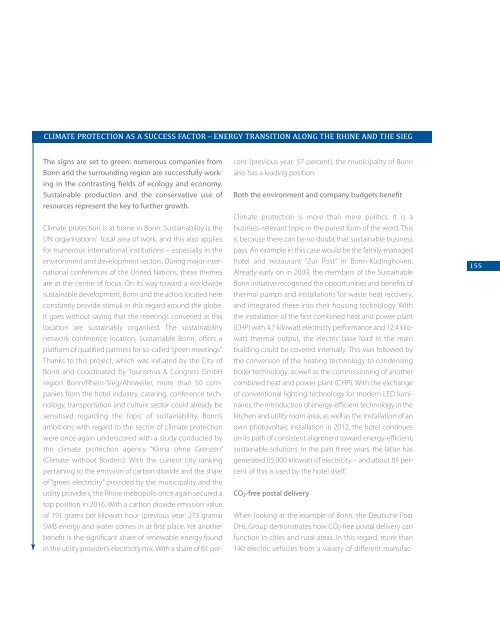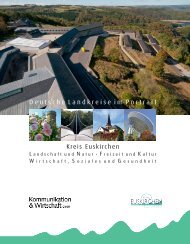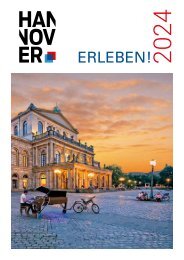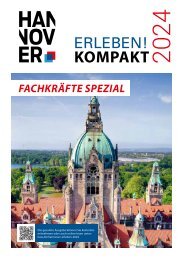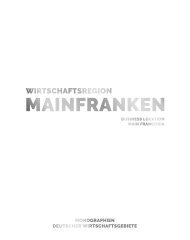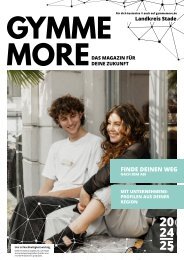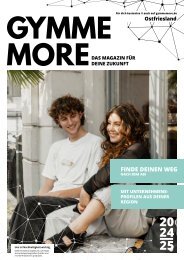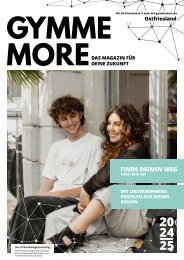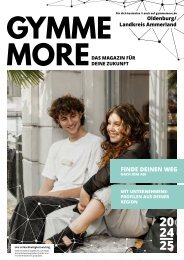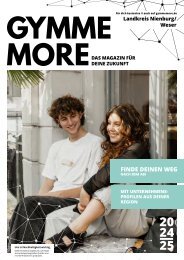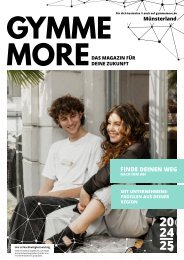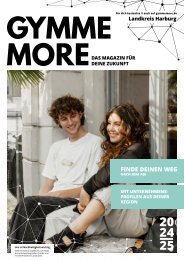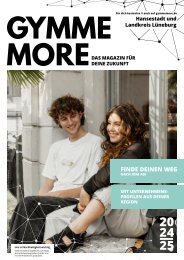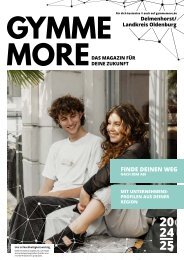Monographie Bonn-Rhein-Sieg
Create successful ePaper yourself
Turn your PDF publications into a flip-book with our unique Google optimized e-Paper software.
CLIMATE PROTECTION AS A SUCCESS FACTOR – ENERGY TRANSITION ALONG THE RHINE AND THE SIEG<br />
The signs are set to green: numerous companies from<br />
<strong>Bonn</strong> and the surrounding region are successfully working<br />
in the contrasting fields of ecology and economy.<br />
Sustainable production and the conservative use of<br />
resources represent the key to further growth.<br />
Climate protection is at home in <strong>Bonn</strong>. Sustainability is the<br />
UN organisations’ focal area of work, and this also applies<br />
for numerous international institutions – especially in the<br />
environment and development sectors. During major inter -<br />
national conferences of the United Nations, these themes<br />
are at the centre of focus. On its way toward a worldwide<br />
sustainable development, <strong>Bonn</strong> and the actors located here<br />
constantly provide stimuli in this regard around the globe.<br />
It goes without saying that the meetings convened at this<br />
location are sustainably organised. The sustainability<br />
network conference location, Sustainable <strong>Bonn</strong>, offers a<br />
platform of qualified partners for so-called “green meetings”.<br />
Thanks to this project, which was initiated by the City of<br />
<strong>Bonn</strong> and coordinated by Tourismus & Congress GmbH<br />
region <strong>Bonn</strong>/Rhein-<strong>Sieg</strong>/Ahrweiler, more than 50 com -<br />
panies from the hotel industry, catering, conference technology,<br />
transportation and culture sector could already be<br />
sensitised regarding the topic of sustainability. <strong>Bonn</strong>’s<br />
ambitions with regard to the sector of climate protection<br />
were once again underscored with a study conducted by<br />
the climate protection agency “Klima ohne Grenzen”<br />
(Climate without Borders). With the current city ranking<br />
pertaining to the emission of carbon dioxide and the share<br />
of “green electricity” provided by the municipality and the<br />
utility providers, the Rhine metropolis once again secured a<br />
top position in 2016. With a carbon dioxide emission value<br />
of 191 grams per kilowatt hour (previous year: 273 grams)<br />
SWB energy and water comes in at first place. Yet another<br />
benefit is the significant share of renewable energy found<br />
in the utility provider’s electricity mix. With a share of 61 percent<br />
(previous year: 57 percent), the municipality of <strong>Bonn</strong><br />
also has a leading position.<br />
Both the environment and company budgets benefit<br />
Climate protection is more than mere politics. It is a<br />
business-relevant topic in the purest form of the word. This<br />
is because there can be no doubt that sustainable business<br />
pays. An example in this case would be the family-managed<br />
hotel and restaurant “Zur Post” in <strong>Bonn</strong>-Küdinghoven.<br />
Already early on in 2009, the members of the Sustainable<br />
<strong>Bonn</strong> initiative recognised the opportunities and benefits of<br />
thermal pumps and installations for waste heat recovery,<br />
and integrated these into their housing technology. With<br />
the installation of the first combined heat and power plant<br />
(CHP) with 4.7 kilowatt electricity performance and 12.4 kilowatt<br />
thermal output, the electric base load in the main<br />
building could be covered internally. This was followed by<br />
the conversion of the heating technology to condensing<br />
boiler technology, as well as the commissioning of another<br />
combined heat and power plant (CHP). With the exchange<br />
of conventional lighting technology for modern LED luminaires,<br />
the introduction of energy-efficient technology in the<br />
kitchen and utility room area, as well as the installation of an<br />
own photovoltaic installation in 2012, the hotel continues<br />
on its path of consistent alignment toward energy-efficient,<br />
sustainable solutions. In the past three years, the latter has<br />
generated 65,000 kilowatt of electricity – and about 85 percent<br />
of this is used by the hotel itself.<br />
CO 2 -free postal delivery<br />
When looking at the example of <strong>Bonn</strong>, the Deutsche Post<br />
DHL Group demonstrates how CO 2 -free postal delivery can<br />
function in cities and rural areas. In this regard, more than<br />
140 electric vehicles from a variety of different manufac -<br />
155


